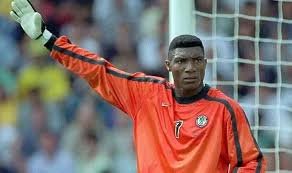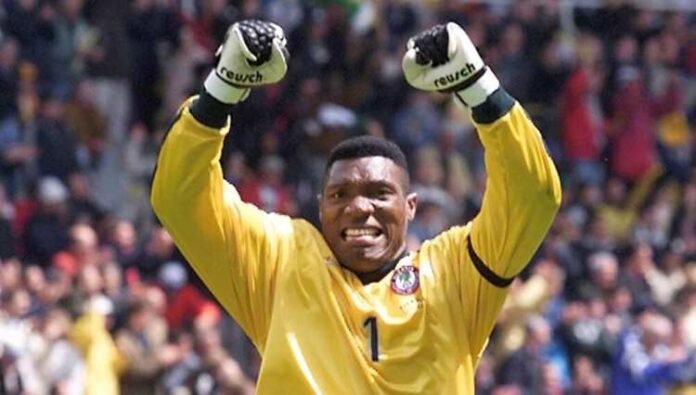Former Nigerian goalkeeper Peter Rufai, who helped his country win the 1994 Africa Cup of Nations, has died at the age of 61.
Nigeria’s football governing body, the Nigerian Football Federation announced the death last Thursday.
Rufai was widely regarded as one of the best African goalkeepers ever and had a 20-year playing career that included stints at clubs in Portugal, Spain, Belgium and the Netherlands.
The Nigerian federation wrote on X that the legacy of Rufai, whose nickname was Dodo Mayana, would live on “between the sticks and beyond.” Local media said he had suffered from a brief, undisclosed illness.
Nigerian President Bola Tinubu also paid tribute to Rufai in a statement yesterday, Friday.
“I recall with fond memories the heroic contributions of Peter Rufai in the historic victory of the Super Eagles at the 1994 edition of the Africa Cup of Nations,” Tinubu said.
He praised Peter Rufai for “bringing honor to the nation and opening a new window of opportunities for young footballers in Nigeria.”
Rufai was part of Nigeria’s 1994 World Cup squad in the U.S. which helped put the country’s football on the global map, alongside the late Rashidi Yekini, Stephen Keshi, Uche Okafor, Wilfred Agbonavbare and Thompson Oliha. He also represented Nigeria at 1998 World Cup in France.

He was the first Nigerian goalkeeper to score a goal for his team internationally, in a 1993 Africa Cup of Nations qualifier against Ethiopia. Rufai, the first Nigerian player to come from a royal family, had more than 60 caps for the Super Eagles.
After retiring from professional football in 2000, he established Staruf Football Academy where he coached young players.
Peter Rufai (24 August 1963 – 3 July 2025) was a Nigerian professional footballer who played for Stationery Stores F.C. in Nigeria as a goalkeeper. He competed professionally in Belgium, the Netherlands, Portugal and Spain, in a senior career that lasted 20 years.
Rufai represented Nigeria in two World Cups and as many Africa Cup of Nations tournaments.
Born in Lagos, Nigeria Rufai started his career in his country, playing with Stationery Stores F.C. and Femo Scorpions. He moved to Benin in 1986, with AS Dragons FC de l’Ouémé.
At a more professional level Rufai spent six years in Belgium, with K.S.C. Lokeren Oost-Vlaanderen and K.S.K. Beveren, although he appeared sparingly. In the 1993–94 season he played 12 matches for Dutch neighbours Go Ahead Eagles, which finished 12th in the Eredivisie.
In 1994, Rufai started a Portuguese adventure with S.C. Farense. In his first year, he was instrumental as the Algarve side only conceded 38 goals in 34 matches, qualifying to the UEFA Cup for the first time ever. His solid performances earned him a transfer to La Liga, but he struggled to start for lowly Hércules CF during his stay, in an eventual relegation.
However, Rufai signed with established Deportivo de La Coruña the ensuing summer, backing up another African, Jacques Songo’o, for two seasons – this included keeping a clean sheet in a January 1998 home win against CD Tenerife (1–0) as the Cameroonian was suspended. He then returned to Portugal for one final year, with modest Gil Vicente FC, also being second-choice.
Rufai returned to Spain in 2003, settling in the country and opening a goalkeeper’s school.
Rufai was the son of a tribal king in the region of Idimu (a town in Nigeria, West Africa). In early 1998, as his father died, he was allowed by his club (Deportivo) to return to Nigeria to discuss the succession, but turned down the status for himself.
Rufai’s oldest son, Senbaty, played as a midfielder, having tried for Sunshine Stars F.C. in the Nigeria Premier League.
Peter Rufai has died at the age of 61 on 3 July 2025 after a long illness.
Additional Source: Africa News, Wikipedia




